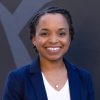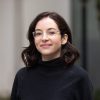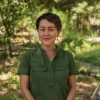Reframing the Narrative: The Evolving Nature of Language in Preservation Planning
Thursday, June 5th | 12pm - 1:30pm
As preservation professionals navigate the complexities of interpreting diverse histories and experiences, the language we use plays a vital role in shaping narratives and fostering inclusivity. This session will explore the development and use of an Inclusive Language Guide as a tool to support equity-centered approaches in preservation planning.
Through a presentation and facilitated discussion, participants will examine the background and process behind the guide’s creation, key considerations, and lessons learned, along with examples of its practical application in real-world preservation projects. The session will highlight the evolving nature of inclusive language and its impact on interpretation and community engagement.
This program is designed to spark meaningful dialogue, encourage reflection, and provide practical strategies for professionals seeking to challenge biases and promote inclusion in their work. We aim to foster a respectful, open, and supportive space where participants feel comfortable learning, asking questions, and sharing their perspectives. To ensure a productive and inclusive experience for all, we ask that attendees engage with curiosity and consideration. Disrespectful or harmful language will not be permitted, and individuals who do not uphold these values may be removed from the program.
Continuing Education Units: AIA - 1.5 LUs | APA - 1.5 CEs. You must attend the program live to receive CEUs (attendance verified though Zoom login.)
Learning Objectives
- Analyze the role of inclusive language in preservation planning and its impact on the interpretation of diverse histories and experiences.
- Explore methodologies for creating and maintaining a living Inclusive Language Guide that evolves with ongoing discourse and professional practice.
- Evaluate how language choices influence equity, inclusion, and accessibility in preservation projects, using case studies and real-world examples.
- Apply best practices and critical thinking strategies to assess and improve language use in preservation work, with the goal of fostering more inclusive and equitable narratives.
Speakers
 Elysha Paluszek
Elysha Paluszek
Senior Associate Architectural Historian & Preservation Planner, ARG
Elysha Paluszek is a Senior Associate Architectural Historian and Preservation Planner at Architectural Resources Group. She has B.A. in History from the College of William and Mary and a Masters in Heritage Conservation from the University of Southern California. She has more than twelve years’ experience in the field of preservation. She specializes in historic context statements and landmark nominations, and she has a passion for telling the stories of marginalized communities through place. Her work has included historical context studies for the cities of West Hollywood, Los Angeles, and Pasadena; landmark nominations associated with the Los Angeles African American community; and a Multiple Property Documentation Form, an overview of the history of the African American community in California which will facilitate the nomination of places significant to the community around the state.
 Morgan Quirk
Morgan Quirk
Associate Architectural Historian & GIS Specialist, ARG
Morgan is an architectural historian based in Portland, Oregon who specializes in data and mapping analysis, with particular interests in cultural heritage and representation. She graduated from the University of Southern California with a B.S. in Urban Planning prior to obtaining her M.S. in Historic Preservation from the University of Texas at Austin. Morgan has worked as a consultant over the last five years, supporting a range of projects related to cultural resource documentation and evaluation, preservation planning, and environmental compliance. Her work has involved local, state, and national landmark nominations, including sites associated with Indigenous peoples and their use of the land, in addition to sites significant to other historically marginalized communities. She also contributed to the African Americans in California Multiple Property Documentation Form, while recently developing an online Story Map for Carson City Hall, designed by African American modernist architect Robert Kennard.
Moderator
 Laura Dominguez, PhD
Laura Dominguez, PhD
Dr. Laura Dominguez is a historian of race, heritage, and place-keeping with over 15 years of experience in heritage conservation. She specializes in co-creating partnerships and projects in California and the West, with expertise in culturally relevant collaborations with women, Latinx, LGBTQ+, immigrant, and Tribal communities. She previously worked in advocacy and education for the Los Angeles Conservancy and San Francisco Heritage. In 2014, she co-founded Latinos in Heritage Conservation and continues to serve on its Board of Directors. She is also a Trustee of the California Preservation Foundation and a former member of the Los Angeles Mayor’s Office Civic Memory Working Group. Her experiences as a practitioner inform her public scholarship, and she is committed to the reparative qualities of conservation and community engagement. Born and raised in the San Gabriel Valley, Dr. Dominguez earned her Ph.D. in history from the University of Southern California in 2023 and her Master of Historic Preservation from USC in 2012. She also holds a bachelor’s degree from Columbia University. She currently serves as a Mellon Humanities Postdoctoral Fellow with American Conservation Experience.
